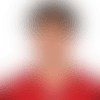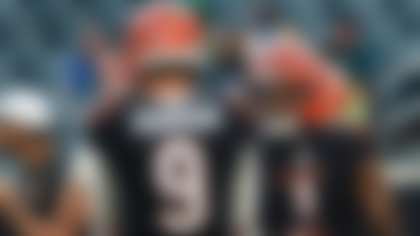One of my favorite offseason tasks is to scour every NFL roster and identify the most underappreciated player on each team using my context-based models. In the fast-paced NFL season, it's easy to focus on superstars or skill-position players who help us win in fantasy football, but one of the most useful applications of analytics is to view every game from the previous campaign through the lens of a total-contribution metric to see where teams earned an edge that perhaps didn't get as much attention as it should have during the season. With that in mind, here's how I came up with my list of the most underappreciated players ...
First, I calculated and then ranked each player's season-long contribution metric by team. To sum it up without getting overly technical, contribution metric measures each player's production during the 2020 season. The metric encompasses a value for every snap by each player and reveals each player's contribution to the team's overall win total. After making those calculations, I ranked each player's salary by position (contract data via the Over The Cap) to add some context around who was being "underappreciated." I gave priority to players who did not switch teams this offseason (since it's hard to be underappreciated by a team you haven't played for yet). Then I weighted players drafted in Round 2 or later who have been to no more than two Pro Bowls. That said, the most critical component to this method is contribution metric.
After revealing the AFC selections on Tuesday, I'm here to provide one player from each NFC team that my model flagged as being underappreciated.

Here's something you probably didn't know: Arizona's defense posted the lowest completion percentage (41.5) and yards-per-attempt allowed (8.2) on downfield passes (20-plus air yards). In fairness, I wouldn't have guessed that if I weren't aggressively tracking this stuff, which helps explain why Murphy's underappreciated. His five passes defensed as the nearest defender on an attempt of 20-plus air yards ranked as the sixth-highest figure in the NFL last year. Murphy has improved his ball tracking (measured by his hips facing the ball) at the second-highest rate of improvement over the past two seasons. His body control (measured by recovery once contacted, avoiding penalties) also increased dramatically in Year 2. And he's still just 23 years old. Furthermore, Pro Football Focus data does a great job of displaying Murphy's improvement in run support, with his run-D grade jumping from 43.6 in 2019 (fifth-lowest among CBs) to 74.7 in 2020.

Jones has been extremely valuable in coverage since entering the league as a second-round pick five years ago. Pro Football Focus rates him as the third-best coverage linebacker since 2016, behind only Lavonte David and Luke Kuechly. Jones was only sparingly used as a pass rusher before the 2020 campaign; according to Next Gen Stats, he had just a 9.4 percent career pass-rush rate (the lowest among linebackers in the NFL who had played at least 3,000 snaps), having logged a career-high 51 pass rushes in 2019. However, in 2020, that last figure nearly doubled to 95. Prior to 2020, his career pressure rate was just 12.8 percent, with six pressures being his single-season high. But his 13 pressures in 2020 led to a 13.7 percent pressure rate, which was 10th-highest among LBs (min. 50 pass rushes). It would be understandable to see the rate decrease a bit with more snaps taken, but Jones' results show his adoption of an expanded role as a pass rusher created quite a bit more value. And with Dean Pees now drawing up the defensive strategy, you have to believe Jones' impact as a blitzer will continue.

The fact that he was franchise-tagged means I am kind of skirting my own arbitrary rules. Still, in 2020, Moton was not a top-paid guy. He was also the only Panther who played 100 percent of last season's snaps on either side of the ball, and he's started all 16 games in each of the past three seasons. Carolina runners averaged 4.6 yards per carry on rushes to the right in 2020, compared with just 4.0 on runs to the left. My tracking shows that Moton's fatigue level (a measure of his lateral quickness, foot speed and snap-to-contact speed from the first quarter to the fourth quarter) diminished the least among all right tackles last season. And on on rushing downs, he held off opposing defenders for about 0.42 seconds more than the average of all starting right tackles.

On the Next Gen Stats front, Robinson is one of just five players with a catch rate over expected of at least +5.0 in each of the last two seasons (min. 100 targets in each season), posting a +5.3 in 2020 and +6.2 in 2019. He was one of just six receivers with 20-plus targets on four different routes in 2020, and managed to haul in 22 of his 30 slant targets (both tops in the NFL). It will be interesting to see if Chicago's offseason additions to the quarterback position and the O-line help Robinson turn an exceptional catch rate over expected into supreme production on such a wide range of routes.

Schultz played the third-most snaps (942) and had the third-highest playtime rate (87.2 percent) among tight ends in 2020. This was a huge boost in action for the 2018 fourth-round pick. In his first two seasons combined, Schultz caught zero passes when aligned in the slot or out wide, compared with 39 grabs for 407 yards and two touchdowns from those alignments in 2020, per Next Gen Stats. He also added 24 receptions for 208 yards and two touchdowns when aligned tight. Prior to 2020, he had just 13 total receptions in two seasons. According to my models, his improvement in the off-ball game (pass- and run-blocking or as a receiver who's not targeted) improved by the biggest margin at the tight end position last season.

Okwara stands out on third down, where his 30 pressures and 23.8 percent pressure rate both led the league in 2020, according to NGS. His 51 overall pressures were more than twice as many as the next-closest Lions (Everson Griffen had 23). Prior to last season's 13.4 pressure rate overall, Okwara had never finished a year in double digits. Measuring Okwara's burst, he improved by about 0.7 seconds in 2020 from any of the four seasons prior. That is a massive increase, likely reflecting both better usage and performance in different alignments, as well as the players around him being more consistent than in prior years.

Amos just led the Packers in snaps played for the second straight season. In coverage, measuring his pursuit (how often his hips were facing the ball/speed to the ball), he ranked fourth-best in the NFL. Pro Football Focus agrees with that computer-vision intel, counting nine forced incompletions on 42 targets in coverage for a 21.4 percent rate, the fifth-highest mark in the NFL (min. 25 targets). This helped give him a lofty 91.5 PFF grade in coverage this past season. Add in his 90.1 grade in run defense from 2017, and Amos is one of just six defensive backs to post a 90-plus in PFF's grading in coverage and against the run since the Penn State product entered the league as a fifth-round pick back in 2015. I will note that Amos' run-stopping production was not the same level of efficiency this past season as it had been in years prior, but part of that was strategic in terms of pre-snap alignment.

Joseph-Day made 55 tackles on 400 defensive snaps, good for a 13.8 percent rate -- the highest among interior defensive linemen, per NGS (min. 300 snaps). On rushing downs, he significantly limited yards gained (ranking sixth-best among interior DLs) and first downs/touchdowns (ninth-best). PFF awarded him a 80.6 overall grade during the 2020 regular season, the third-best mark on the Rams' defense (behind only Aaron Donald and John Johnson).

Rushing efficiency is very strongly tied to this Vikings offense's overall success, and O'Neill played a big role in the ground game last season. Next Gen Stats show that Minnesota earned 4.37 expected yards per rush on runs to the right, compared to 3.93 on runs to the left to the left. Since 2018, when O'Neill was a rookie starter, Dalvin Cook has logged 2,335 rushing yards and 21 touchdowns on runs outside the tackles -- both of those figures rank fourth among NFL running backs, per NGS. Pro Football Focus grades show that O'Neill has significantly improved in run-blocking during his NFL tenure, going from a 58.3 grade in 2018 (ranking 59th) to 83.7 in 2020 (eighth).

In each of the past two seasons, Onyemata played the most snaps among Saints interior defensive linemen (565 in 2020, 527 in 2019). According to Next Gen Stats, he is also New Orleans' only interior DL with at least 20 pressures in each of the past four seasons. (He and Cameron Jordan are the only Saints to achieve that feat, while only 10 others across the league have followed suit.) Measuring his burst velocity (time it takes to travel 2 yards, with or without contact), Onyemata was the seventh-best player at his position on any down last season, and fourth-best in the fourth quarter.

With 474 snaps on the left and 396 on the right in 2020, per NGS, Bradberry traveled more than most CBs. In fact, he was one of just two corners to play 350-plus snaps on each side last season. Measuring his computer vision-derived coverage ability (passes defensed, targets resulting in no catch, interceptions and allowing fewer than 1 yard of YAC per catch), Bradberry had his best season to date. PFF agrees with my data, showing that Bradberry allowed just a career-low 70.1 passer rating last season.

No team used 12 personnel (1 RB, 2 TE, 2 WR) more than the Eagles last season (33.2 percent), so Goedert got plenty of burn alongside Zach Ertz. Next Gen Stats show that Goedert had a +6.3 catch rate over expected with Carson Wentz at QB, compared with just a +3.8 once Jalen Hurts took over. However, Philadelphia's O-line and receiving corps were more depleted by injuries as the season progressed, and Goedert's usage changed with Hurts under center. With Goedert on the field, Hurts averaged 7.7 yards per attempt with a 4:1 touchdown-to-interception ratio. With Goedert off the field, Hurts averaged 6.5 yards per attempt with a 2:3 TD-to-INT ratio. Per NGS, Goedert averaged 8.8 air yards per target in 2020 (up 3 full yards from 2019) and caught three passes of 20-plus air yards. Computer vision shows his run blocking was second-best in the NFL at the tight end position. In other words, the transition to Hurts created a lot more use cases for Goedert both as a target and when he was creating for others, especially in the run game.

Here's an awesome Next Gen Stat: In his injury-abbreviated 2020 campaign, Samuel was the only receiver to earn more YAC (406) than actual receiving yards (391). Pro Football Focus shows that he cut down on the drops, going from 10 (on 77 targets) as a rookie to three (on 44 targets) last season. Per NGS, Samuel logged 13 receptions, 197 yards and a touchdown on 15 crossing-route targets for a 141.0 passer rating when targeted on such passes. I love pre-snap motion for this offense -- it's a catalyst for efficiency, given the types of run and play-action concepts that define Kyle Shanahan's attack. I think this will be important for whoever is playing QB in 2021, with Samuel on the move on 26.1 percent of snaps last season (the fourth-highest rate among WRs). Samuel's route tree was really interesting in 2020, with 22.7 percent crossing routes, 20.3 go routes and 10.5 hitches -- no other route reached 10 percent. In other words, I'm really excited to see how Samuel evolves with a new passing coordinator -- and quite possibly a new quarterback, depending on Trey Lance's readiness.

The 2020 campaign was a big step forward for Ford, who had 12 pressures in the last six games of the season and 23 total, his career-best. Measuring his burst over his three NFL campaigns, 2020 was his fastest season yet by about 0.2 seconds. His run-game win share increased by 0.08 wins last season, which was the fourth-biggest improvement at the position.

Edwards made quite a splash at just the right time. Before the NFC Championship Game against Green Bay, the safety had played a grand total of 202 defesnive snaps. But he performed when it mattered most -- logging 69 snaps against Green Bay and 32 against Kansas City in the Super Bowl -- so he's the pick here. In the final two games of Tampa's season, Edwards' off-ball metric (how he covered his assignments when they weren't targeted) was at a level that'd typically rank among the top five percent of defensive backs. And according to Pro Football Focus, Edwards allowed just 56 total yards on 256 coverage snaps in 2020, including the playoffs -- tied for the second-fewest among players with at least 200 snaps. I also like this pick because Edwards forecasts to continue improving in Year 3.

Not going to lie: This selection is a super-fortunate function of the parameters I laid out in the intro. McLaurin isn't likely to be eligible for this list going forward, so I will take the low-hanging fruit right now, because not only do my metrics think he's the most underrated player on the team, but he's one of the most valuable players at his position across the league. McLaurin's 638 receiving yards on in-breaking routes were the second-most in the NFL. His +154 yards after the catch over expected ranked fourth in the NFL. One more juicy NGS tidbit on McLaurin: He generated 2.5 yards of separation per target against press coverage (fourth-most, min. 25 targets).
Follow Cynthia Frelund on Twitter.




























